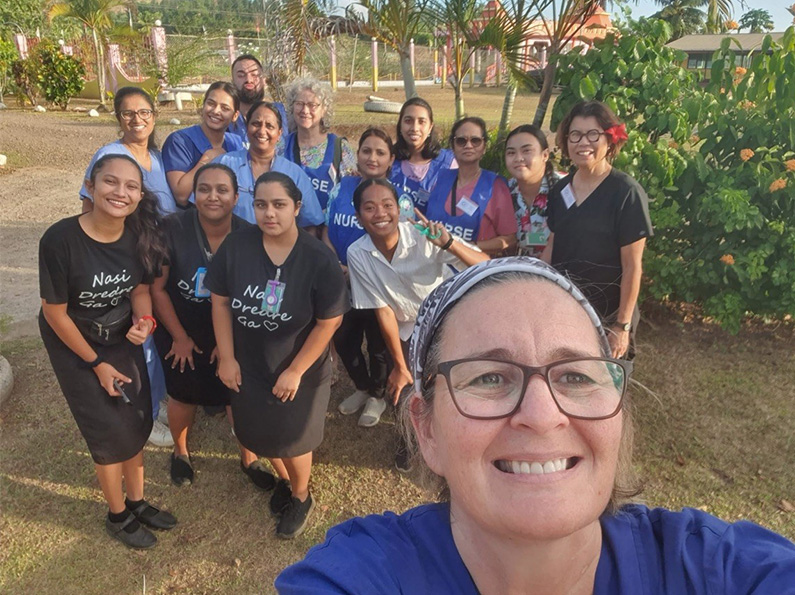Three dedicated clinical staff members recently returned from an eye-opening volunteering trip to Fiji to provide health services and training to local communities. Each representing a different volunteer-based organisation, and supported by Mobile Surgical, Stacey Lovell, PACU registered nurse, spent her days at local schools providing much-needed care to patients of all ages. Keeley Lawson, anaesthetic technician, found herself in a new specialist children’s hospital providing support and working collaboratively with other health professionals during paediatric cardiac surgery. Meanwhile, Karenza Heath, clinical nurse leader, dedicated her efforts in a public hospital, addressing a wide range of medical needs. Despite their varied experiences, all three were struck by the significant challenges Fijians face in accessing healthcare, where the standard of public healthcare services is basic, under resourced and lacking basic supplies. The trip not only allows the clinical staff to share their expertise and improve health outcomes in Fiji but also fosters a sense of global community and cultural exchange. By participating in this annual initiative, the team gain invaluable experience and insights that adds to their personal growth. Their stories highlight the critical role of volunteer efforts in bridging the gaps of improved healthcare.
My story: Stacey Lovell
Stacey Lovell (pictured above with the nursing team) is a registered nurse and works on a casual basis for Mobile Surgical. She has been volunteering with Sri Sathya Sai Healthcare, which runs the Sri Sathya Sai Medical Camps for the past 14 years; each time more committed to making a difference and hoping to instil long-term benefits. Sri Sathya Sai Medical Camps are brought into disadvantaged, underserved and often remote areas throughout the world, offering a range of medical services including general health check-ups, diagnostic tests and treatments for various illnesses. The purpose of these medical camps is to provide healthcare services to people who may not have access to medical facilities due to their geographical location or financial constraints.
Earlier this year, she was part of an 80 strong team of volunteers and stayed in Labasa, a town in Vanua Levu. Generally, the locations the team visit is determined by the Fijian Ministry of Health and some of the team doctors who are familiar with the Fijian healthcare system. Stacey worked in nearby schools which are typically underfunded. The services offered included nursing triage, general practitioners, dentists, physiotherapists, dieticians, scopes, optometrists and gynaecology. Her role was to oversee the nursing triage team and this year, ran the lab for the first time.
“We have a specialist oncologist in the team and this year we were lucky enough to have a paediatrician join us. Including the medical team and the many volunteers needed to provide the support services,” Stacey says.
“After the patents are registered, they make their way to triage to have a quick assessment and are referred to the appropriate services. This can be a massive challenge for many reasons. Firstly, the sheer number of people – on average 450 patients a day will pass through. Some are seen and discharged at triage. Some just want a quick check-up. If everything is OK, we provided education and basic treatment at triage.”
Stacey recalls devastating cases of patients dying when they could have been treated. “…Others are living with diseases that could be treated or at least managed.”
Although she has been volunteering for 14 years, she is still struck by the stark reality of healthcare in the region. Many Fijians lack access to basic medical services, with dental hygiene, eyesight and health literacy at alarmingly low levels. “What stands out to me is that the vast majority of people cannot access a trusted health care source. Hypertension and hyperglycaemia are the most common medical conditions.”
“Underfunding over the years has led to a complete disconnect between doctors, nurses and their patients. This is especially true in the rural areas. The people have lost trust in their health system.”
Underfunding is evident and the gap between the needs of the patients and the capabilities of the healthcare system remained wide. Despite the challenges, the gratitude and resilience of the Fijian people deeply moved her. This experience not only highlighted the urgent need for improved healthcare infrastructure but also reinforced Stacey’s commitment to making a difference.
Beyond the long, hot and humid days, her time in Fiji was a powerful reminder of the impact that dedicated healthcare professionals can have on underserved communities; and the experience has deepened her understanding about the culture of Fijians and pacific islanders.
“The gratitude of the people of Fiji is humbling. I love educating the local health workers as well as the patients.”
Learn more about Sri Sathya Sai Healthcare
My story: Keeley Lawson
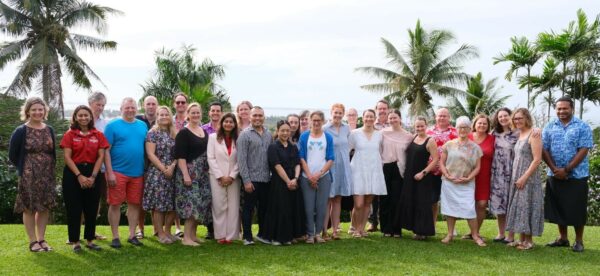 Keeley Lawson is one of Mobile Surgical’s anaesthetic technicians onboard the mobile surgical unit. She has been part of the Heart4Kids organisation since its inception in 2014, where a dedicated team of 35 health professionals undertake one “surgical mission” each year. In July/August this year, a 10-day volunteer trip took them to Sri Sathya Sai Sanjeevani Children’s Hospital in Suva, a purpose-built Children’s Heart Hospital opened in April 2022. The hospital is a $25 million development and has regular volunteering teams visiting from many different countries that arrive to offer their expertise and surgical skills throughout the year. During this trip, the team operated on 15 Fijian and Pacific Island children with Congenital Heart Disease (CHD) (from Vanuatu, Samoa, Tuvalu and Kiribati). The youngest patient was three months old and weighed 4.3kg and the oldest patient was a 15-year-old who weighed 72kg.
Keeley Lawson is one of Mobile Surgical’s anaesthetic technicians onboard the mobile surgical unit. She has been part of the Heart4Kids organisation since its inception in 2014, where a dedicated team of 35 health professionals undertake one “surgical mission” each year. In July/August this year, a 10-day volunteer trip took them to Sri Sathya Sai Sanjeevani Children’s Hospital in Suva, a purpose-built Children’s Heart Hospital opened in April 2022. The hospital is a $25 million development and has regular volunteering teams visiting from many different countries that arrive to offer their expertise and surgical skills throughout the year. During this trip, the team operated on 15 Fijian and Pacific Island children with Congenital Heart Disease (CHD) (from Vanuatu, Samoa, Tuvalu and Kiribati). The youngest patient was three months old and weighed 4.3kg and the oldest patient was a 15-year-old who weighed 72kg.
“My role as anaesthetic technician team leader requires me to organise equipment, consumable stock and pharmaceutical drugs required for anaesthesia. This is all done pre-mission, so we have to take everything we need with us, as we prefer to provide the items we require rather than taking them from the local people that might already be in short supply. I also have to think on my feet at times and come up with solutions to problems that may arise with equipment, or lack thereof,” Keeley says.
“The impact of the care the children receive however is lifesaving. The hospital runs regular clinics for children to have heart scans and health checks, which has picked up congenital defects in a number of babies and children that would otherwise be missed. Also, the families that stay for their child’s treatment and recovery post-op have good facilities that they can use and get fed by the hospital (in the public hospital they have to provide food for themselves and often for their child).”
Unlike her routine in New Zealand, she witnessed the entire patient journey – from pre-op to recovery – all within a condensed timeframe. This unique experience allowed her to see the immediate impact of her work, offering a profound sense of accomplishment. The environment highlighted the progress made in just a short period, providing a rewarding contrast to her usual practice. This hands-on involvement not only enriched her professional skills but also deepened her appreciation for the resilience and gratitude of the patients she served. “We often get follow up reports and pictures from the local team when the children come back for clinic appointments after we have left, it’s generally a happy story so gives a good sense of well-being.”
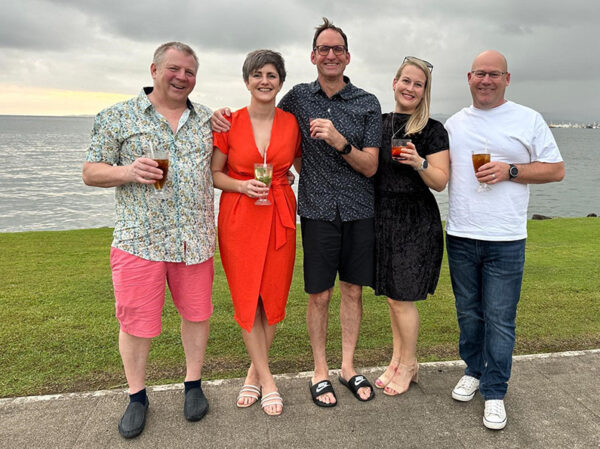 She says the most enjoyable part of volunteering in Fiji is the firsthand observation of the children following surgery. “…seeing the change in them once they have had their surgery. The difference in the way they look, act and move around is amazing. They just take everything in their stride, for most of them you wouldn’t even know they’d had major surgery in the last few days.”
She says the most enjoyable part of volunteering in Fiji is the firsthand observation of the children following surgery. “…seeing the change in them once they have had their surgery. The difference in the way they look, act and move around is amazing. They just take everything in their stride, for most of them you wouldn’t even know they’d had major surgery in the last few days.”
“The teamwork and can-do attitude of the Hearts4Kids team as well as how welcoming and friendly the local staff are, nothing is ever too much trouble if we need help with something.”
She adds that although the hospital theatres are great, the most noticeable issue is the insufficient funding for maintaining equipment and replenishing consumables.
Learn more about Heart4Kids
My story: Karenza Heath
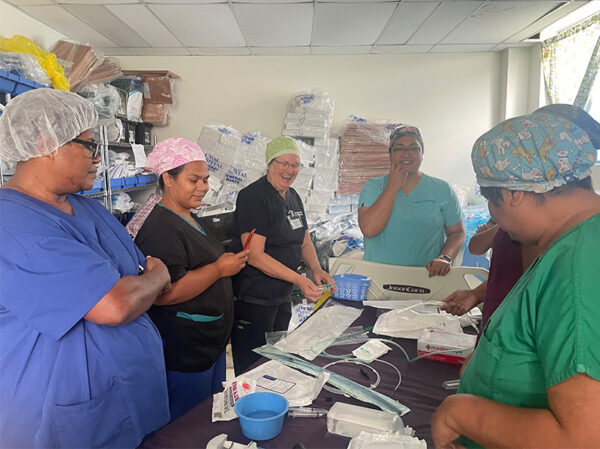 Karenza Heath is a clinical nurse leader on the surgical unit, working alongside her husband, Chris Heath, who works as an anaesthetic technician. She learned of the volunteering programme through Michael Schultz, a clinical leader of the Gastroenterology unit at Dunedin Hospital and board member of ANZGITA (Australia and New Zealand Gastroenterology International Training Association), a volunteer-based training organisation. ANZGITA runs a four-week programme in Fiji once a year and services doctors and nurses in developing Asia-Pacific countries through regular in-country intensive training programmes with local partners and virtual tele-education. When Karenza isn’t working on the surgical unit, she works as a charge nurse for Michael’s private endoscopy clinic in Wanaka. Encouraged by Michael to join the volunteering team, she set off on her first trip to Fiji for two weeks in July, working with two endoscopists and two nurses. There were also 14 trainee endoscopy doctors and 10 nurses from Fiji and the surrounding pacific islands. She stayed in the small town of Lami, 20 minutes outside of Suva, and worked at the Colonial War Memorial Hospital. It’s the oldest and largest hospital in Fiji built in 1923 and has eight operating theatres although only four were functional at the time. The hospital also acts as a teaching hospital with students from Fiji School of Medicine and Fiji School of Nursing having campuses based at the hospital since 1928. Karenza worked mainly with the nurses in the cleaning/reprocessing area and the purpose of her visit was to teach the nurses about endoscopy nursing, which included assisting at the bedside, looking after the patients and reprocessing the endoscopes. (Pictured above left: Karenza spent a day teaching the trainee endoscopy nurses with hands-on experience with various consumable items)
Karenza Heath is a clinical nurse leader on the surgical unit, working alongside her husband, Chris Heath, who works as an anaesthetic technician. She learned of the volunteering programme through Michael Schultz, a clinical leader of the Gastroenterology unit at Dunedin Hospital and board member of ANZGITA (Australia and New Zealand Gastroenterology International Training Association), a volunteer-based training organisation. ANZGITA runs a four-week programme in Fiji once a year and services doctors and nurses in developing Asia-Pacific countries through regular in-country intensive training programmes with local partners and virtual tele-education. When Karenza isn’t working on the surgical unit, she works as a charge nurse for Michael’s private endoscopy clinic in Wanaka. Encouraged by Michael to join the volunteering team, she set off on her first trip to Fiji for two weeks in July, working with two endoscopists and two nurses. There were also 14 trainee endoscopy doctors and 10 nurses from Fiji and the surrounding pacific islands. She stayed in the small town of Lami, 20 minutes outside of Suva, and worked at the Colonial War Memorial Hospital. It’s the oldest and largest hospital in Fiji built in 1923 and has eight operating theatres although only four were functional at the time. The hospital also acts as a teaching hospital with students from Fiji School of Medicine and Fiji School of Nursing having campuses based at the hospital since 1928. Karenza worked mainly with the nurses in the cleaning/reprocessing area and the purpose of her visit was to teach the nurses about endoscopy nursing, which included assisting at the bedside, looking after the patients and reprocessing the endoscopes. (Pictured above left: Karenza spent a day teaching the trainee endoscopy nurses with hands-on experience with various consumable items)
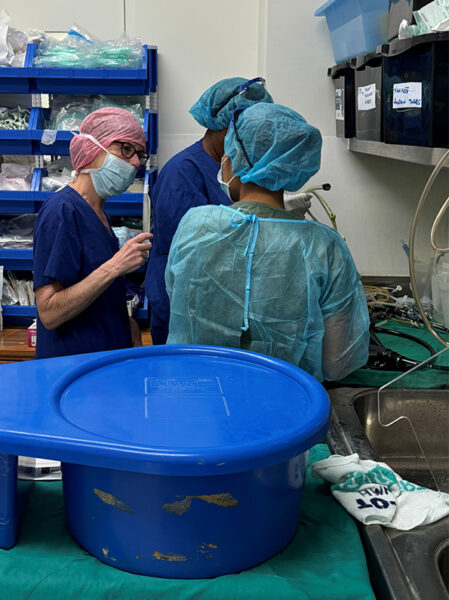 Unfortunately, a significant number of Fijians are affected by Non-Communicable Diseases (NCDs) such as diabetes, heart disease, liver disease and cancers. These conditions often come with high treatment costs. “Each day we would arrive to a list of patients requiring either a gastroscopy or colonoscopy. What we saw during scoping was oesophageal varices, oesophageal strictures and colon cancers that were, at times, advanced,” Karenza says.
Unfortunately, a significant number of Fijians are affected by Non-Communicable Diseases (NCDs) such as diabetes, heart disease, liver disease and cancers. These conditions often come with high treatment costs. “Each day we would arrive to a list of patients requiring either a gastroscopy or colonoscopy. What we saw during scoping was oesophageal varices, oesophageal strictures and colon cancers that were, at times, advanced,” Karenza says.
Clinically, Karenza gained experience with procedures not typically performed in the surgical unit, such as banding oesophageal varices, oesophageal dilation, and endoscopic retrograde cholangiopancreatography (ERCP). (Pictured right: Karenza teaching in the reprocessing room)
Michael had given Karenza numerous pre-trip briefings, emphasising the need to adapt to “Fiji time.” This meant not rushing to complete tasks, being prepared for patients to show up or not show up unpredictably and understanding that the hospital and its supplies were quite basic.
“The list of patients presented on the whiteboard rarely stayed the same, the names would change multiple times during the day for reasons we never really knew about. Michael’s advice of working on Fiji time proved to be good advice, sometimes we would have delays waiting for patients and sometimes no patients at all for part of the day and then we could work until late because we had so many.”
A paediatric endoscopist from Australia was part of the team, which was a great learning opportunity for the permanent doctors at Suva hospital and the trainees. Local doctors and nurses were crucial in helping the volunteer team understand local customs.
During her trip, Karenza observed how the Fijian healthcare facilities lacked basic equipment and supplies. “My first impression of the theatre we were working in was that it was not that bad, there seemed to be all the relevant equipment we needed. It was only as time went on that I became aware of how much was lacking. They have a lot of equipment donated but it not always what they need on a basic level. There are disposable gloves, but they are extra-large only. There are no dry disposable wipes that we take for granted here in New Zealand and that you use all the time in endoscopy. Many single use items are reused.”
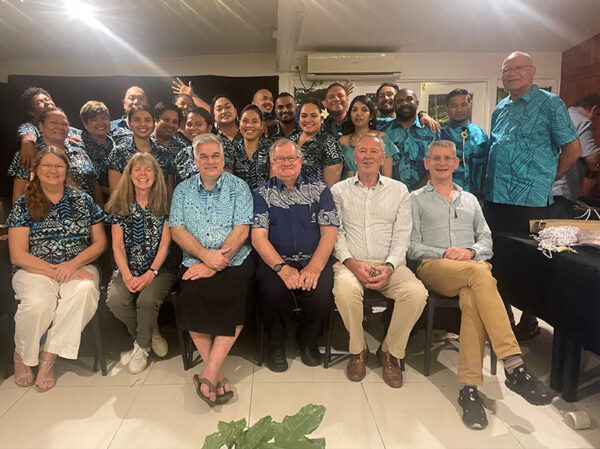 “The doctors and nurses I met were dedicated and committed to helping their patients but through no fault of their own they work in an environment where they are lacking in basic services and resources. I cannot speak highly enough of them.”
“The doctors and nurses I met were dedicated and committed to helping their patients but through no fault of their own they work in an environment where they are lacking in basic services and resources. I cannot speak highly enough of them.”
Karenza reflects on her time in Fiji as a positive experience and would go back again as a volunteer. “We had so many laughs. Usually, the beautiful music of Polynesia would be playing and there was occasionally a little bit of dancing. It was awesome to get to know them all. They show real commitment as they stay for four weeks in Suva to complete the programme. One nurse had left her 10-month-old baby with family to attend,” she says. (Pictured left: Karenza on her last night of the four-week programme. The celebration included certificates provided to the trainers, nurses and doctors who attended the training programme).
“I learned about how people live positive lives with so little. I was happy I could give back by sharing my knowledge with them.”
Despite facing significant challenges in their healthcare system, including long wait times to see a doctor, Fijians and Pacific Islanders exhibit a remarkable resilience and positivity. “They are wonderful; they always had a smile for me even when they had been lying on a hospital trolley in the corridor for hours. Despite any discomfort during the procedures, the patients never complained or made a fuss. They were so grateful we were there and for the treatment they received. It was a privilege for me to go there and I felt humbled by their kindness. The Fijian people are simply amazing.”
Learn more about ANZGITA
